- Home
- Henry James
Henry James Page 13
Henry James Read online
Page 13
There must have been on that occasion of the Sing-Sing day—which it deeply interests me to piece together—some state of connection for some of us with the hospitalities of Rhinebeck, the place of abode of the eldest of the Albany uncles—that is of the three most in our view; for there were two others, the eldest of all a half-uncle only, who formed a class quite by himself, and the very youngest, who, with lively interests of his own, had still less attention for us than either of his three brothers. The house at Rhinebeck and all its accessories (which struck our young sense as innumerable,) in especial the great bluff of the Hudson on which it stood, yields me images scarcely dimmed, though as the effect but of snatches of acquaintance; there at all events the gently-groaning—ever so gently and dryly—Albany grandmother, with the Albany cousins as to whom I here discriminate, her two adopted daughters, maturest and mildest of the general tribe, must have paused for a stay; a feature of which would be perhaps her juncture with the New York contingent, somewhere sociably achieved, for the befriending of juvenile Gussy. It shimmers there, the whole circumstance, with I scarce know what large innocence of charity and ease; the Gussy-pretext, for reunion, all so thin yet so important an appeal, the simplicity of the interests and the doings, the assumptions and the concessions, each to-day so touching, almost so edifying. We were surely all gentle and generous together, floating in such a clean light social order, sweetly proof against ennui—unless it be a bad note, as is conceivable, never, never to feel bored—and thankful for the smallest æsthetic or romantic mercies. My vision loses itself withal in vaster connections—above all in my general sense of the then grand newness of the Hudson River Railroad; so far at least as its completion to Albany was concerned, a modern blessing that even the youngest of us were in a position to appraise. The time had been when the steamboat had to content us—and I feel how amply it must have done so as I recall the thrill of docking in dim early dawns, the whole hour of the Albany waterside, the night of huge strange paddling and pattering and shrieking and creaking once ended, and contrast with it all certain long sessions in the train at an age and in conditions when neither train nor traveller had suffered chastening; sessions of a high animation, as I recast them, but at the same time of mortal intensities of lassitude. The elements here indeed are much confused and mixed—I must have known that discipline of the hectic interest and the extravagant strain in relation to Rhinebeck only; an étape, doubtless, on the way to New York, for the Albany kinship, but the limit to our smaller patiences of any northward land-journey. And yet not the young fatigue, I repeat, but the state of easy wonder, is what most comes back: the stops too repeated, but perversely engaging; the heat and the glare too great, but the river, by the window, making reaches and glimpses, so that the great swing of picture and force of light and colour were themselves a constant adventure; the uncles, above all, too pre-eminent, too recurrent, to the creation of a positive soreness of sympathy, of curiosity, and yet constituting by their presence half the enlargement of the time. For the presence of uncles, incoherent Albany uncles, is somehow what most gives these hours their stamp for memory. I scarce know why, nor do I much, I confess, distinguish occasions—but I see what I see: the long, the rattling car of the old open native form and the old harsh native exposure; the sense of arrival forever postponed, qualified however also by that of having in my hands a volume of M. Arsène Houssaye, Philosophes et Comédiennes, remarkably submitted by one of my relatives to my judgment. I see them always, the relatives, in slow circulation; restless and nervous and casual their note, not less than strikingly genial, but with vaguenesses, lapses, eclipses, that deprived their society of a tactless weight. They cheered us on, in their way; born optimists, clearly, if not logically determined ones, they were always reassuring and sustaining, though with a bright brevity that must have taken immensities, I think, for granted. They wore their hats slightly toward the nose, they strolled, they hung about, they reported of progress and of the company, they dropped suggestions, new magazines, packets of the edible deprecated for the immature; they figured in fine to a small nephew as the principal men of their time and, so far as the two younger and more familiar were concerned, the most splendid as to aspect and apparel. It was none the less to the least shining, though not essentially the least comforting, of this social trio that, if I rightly remember, I owed my introduction to the chronique galante of the eighteenth century.
There tags itself at any rate to the impression a flutter as of some faint, some recaptured, grimace for another of his kindly offices (which I associate somehow with the deck of a steamboat:) his production for our vague benefit of a literary classic, the Confessions, as he called our attention to them, of the celebrated “Rosseau.” I catch again the echo of the mirth excited, to my surprise, by this communication, and recover as well my responsive advance toward a work that seemed so to promise; but especially have I it before me that some play of light criticism mostly attended, on the part of any circle, this speaker’s more ambitious remarks. For all that, and in spite of oddities of appearance and type, it was Augustus James who spread widest, in default of towering highest, to my wistful view of the larger life, and who covered definite and accessible ground. This ground, the house and precincts of Linwood, at Rhinebeck, harboured our tender years, I surmise, but at few and brief moments; but it hadn’t taken many of these to make it the image of an hospitality liberal as I supposed great social situations were liberal; suppositions on this score having in childhood (or at least they had in mine) as little as possible to do with dry data. Didn’t Linwood bristle with great views and other glories, with gardens and graperies and black ponies, to say nothing of gardeners and grooms who were notoriously and quotedly droll; to say nothing, in particular, of our aunt Elizabeth, who had been Miss Bay of Albany, who was the mother of the fair and free young waltzing-women in New York, and who floats back to me through the Rhinebeck picture, aquiline but easy, with an effect of handsome high-browed, high-nosed looseness, of dressing-gowns or streaming shawls (the dowdy, the delightful shawl of the period;) and of claws of bright benevolent steel that kept nipping for our charmed advantage: roses and grapes and peaches and currant-clusters, together with turns of phrase and scraps of remark that fell as by quite a like flash of shears. These are mere scrapings of gold-dust, but my mind owes her a vibration that, however tiny, was to insist all these years on marking—on figuring in a whole complex of picture and drama, the clearest note of which was that of worry and woe: a crisis prolonged, in deep-roofed outer galleries, through hot August evenings and amid the dim flare of open windows, to the hum of domesticated insects. All but inexpressible the part played, in the young mind naturally even though perversely, even though inordinately, arranged as a stage for the procession and exhibition of appearances, by matters all of a usual cast, contacts and impressions not arriving at the dignity of shocks, but happening to be to the taste, as one may say, of the little intelligence, happening to be such as the fond fancy could assimilate. One’s record becomes, under memories of this order—and that is the only trouble—a tale of assimilations small and fine; out of which refuse, directly interesting to the subject-victim only, the most branching vegetations may be conceived as having sprung. Such are the absurdities of the poor dear inward life—when translated, that is, and perhaps ineffectually translated, into terms of the outward and trying at all to flourish on the lines of the outward; a reflection that might stay me here weren’t it that I somehow feel morally affiliated, tied as by knotted fibres, to the elements involved.
One of these was assuredly that my father had again, characteristically, suffered me to dangle; he having been called to Linwood by the dire trouble of his sister, Mrs. Temple, and brought me with him from Staten Island—I make the matter out as of the summer of ’54. We had come up, he and I, to New York; but our doings there, with the journey following, are a blank to me; I recover but my sense, on our arrival, of being for the first time in the presence of tragedy, which the shining scene, rounda
bout, made more sinister—sharpened even to the point of my feeling abashed and irrelevant, wondering why I had come. My aunt, under her brother’s roof, had left her husband, wasted with consumption, near death at Albany; gravely ill herself—she had taken the disease from him as it was taken in those days, and was in the event very scantly to survive him—she had been ordered away in her own interest, for which she cared no scrap, and my father, the person in all his family most justly appealed and most anxiously listened to, had been urged to come and support her in a separation that she passionately rejected. Vivid to me still, as floating across verandahs into the hot afternoon stillness, is the wail of her protest and her grief; I remember being scared and hushed by it and stealing away beyond its reach. I remember not less what resources of high control the whole case imputed, for my imagination, to my father; and how, creeping off to the edge of the eminence above the Hudson, I somehow felt the great bright harmonies of air and space becoming one with my rather proud assurance and confidence, that of my own connection, for life, for interest, with such sources of light. The great impression, however, the one that has brought me so far, was another matter: only that of the close, lamp-tempered, outer evening aforesaid, with my parent again, somewhere deep within, yet not too far to make us hold our breath for it, tenderly opposing his sister’s purpose of flight, and the presence at my side of my young cousin Marie, youngest daughter of the house, exactly of my own age, and named in honour of her having been born in Paris, to the influence of which fact her shining black eyes, her small quickness and brownness, marking sharply her difference from her sisters, so oddly, so almost extravagantly testified. It had come home to me by some voice of the air that she was “spoiled,” and it made her in the highest degree interesting; we ourselves had been so associated, at home, without being in the least spoiled (I think we even rather missed it:) so that I knew about these subjects of invidious reflection only by literature—mainly, no doubt, that of the nursery—in which they formed, quite by themselves, a romantic class; and, the fond fancy always predominant, I prized even while a little dreading the chance to see the condition at work. This chance was given me, it was clear—though I risk in my record of it a final anticlimax—by a remark from my uncle Augustus to his daughter: seated duskily in our group, which included two or three dim dependent forms, he expressed the strong opinion that Marie should go to bed—expressed it, that is, with the casual cursory humour that was to strike me as the main expressional resource of outstanding members of the family and that would perhaps have had under analysis the defect of making judgment very personal without quite making authority so. Authority they hadn’t, of a truth, these all so human outstanding ones; they made shift but with light appreciation, sudden suggestion, a peculiar variety of happy remark in the air. It had been remarked but in the air, I feel sure, that Marie should seek her couch—a truth by the dark wing of which I ruefully felt myself brushed; and the words seemed therefore to fall with a certain ironic weight. What I have retained of their effect, at any rate, is the vague fact of some objection raised by my cousin and some sharper point to his sentence supplied by her father; promptly merged in a visible commotion, a flutter of my young companion across the gallery as for refuge in the maternal arms, a protest and an appeal in short which drew from my aunt the simple phrase that was from that moment so preposterously to “count” for me. “Come now, my dear; don’t make a scene—I insist on your not making a scene!” That was all the witchcraft the occasion used, but the note was none the less epoch-making. The expression, so vivid, so portentous, was one I had never heard—it had never been addressed to us at home; and who should say now what a world one mightn’t at once read into it? It seemed freighted to sail so far; it told me so much about life. Life at these intensities clearly became “scenes”; but the great thing, the immense illumination, was that we could make them or not as we chose. It was a long time of course before I began to distinguish between those within our compass more particularly as spoiled and those producible on a different basis and which should involve detachment, involve presence of mind; just the qualities in which Marie’s possible output was apparently deficient. It didn’t in the least matter accordingly whether or no a scene was then proceeded to—and I have lost all count of what immediately happened. The mark had been made for me and the door flung open; the passage, gathering up all the elements of the troubled time, had been itself a scene, quite enough of one, and I had become aware with it of a rich accession of possibilities.
XIV
IT MUST have been after the Sing-Sing episode that Gussy came to us, in New York, for Sundays and holidays, from scarce further off than round the corner—his foreign Institution flourishing, I seem to remember, in West Tenth Street or wherever—and yet as floated by exotic airs and with the scent of the spice-islands hanging about him. He was being educated largely with Cubans and Mexicans, in those New York days more than half the little flock of the foreign Institutions in general; over whom his easy triumphs, while he wagged his little red head for them, were abundantly credible; reinforced as my special sense of them was moreover by the similar situation of his sister, older than he but also steeped in the exotic medium and also sometimes bringing us queer echoes of the tongues. I remember being deputed by my mother to go and converse with her, on some question of her coming to us, at the establishment of Madame Reichhardt (pronounced, à la française, Réchard,) where I felt that I had crossed, for the hour, the very threshold of “Europe”; it being impressed on me by my cousin, who was tall and handsome and happy, with a laugh of more beautiful sound than any laugh we were to know again, that French only was speakable on the premises. I sniffed it up aromatically, the superior language, in passage and parlour—it took the form of some strong savoury soup, an educational potage Réchard that must excellently have formed the taste: that was again, I felt as I came away, a part of the rich experience of being thrown in tender juvenile form upon the world. This genial girl, like her brother, was in the grand situation of having no home and of carrying on life, such a splendid kind of life, by successive visits to relations; though neither she nor Gussy quite achieved the range of their elder brother, “Bob” of that ilk, a handsome young man, a just blurred, attractive, illusive presence, who hovered a bit beyond our real reach and apparently displayed the undomesticated character at its highest. He seemed exposed, for his pleasure—if pleasure it was!—and my wonder, to every assault of experience; his very name took on, from these imputations, a browner glow; and it was all in the right key that, a few years later, he should, after “showing some talent for sculpture,” have gone the hapless way of most of the Albany youth, have become a theme for sad vague headshakes (kind and very pitying in his case) and died prematurely and pointlessly, or in other words, by my conception, picturesquely. The headshakes were heavier and the sighs sharper for another slim shade, one of the younger and I believe quite the most hapless of those I have called the outstanding ones; he too, several years older than we again, a tormenting hoverer and vanisher; he too charmingly sister’d, though sister’d only, and succumbing to monstrous early trouble after having “shown some talent” for music. The ghostliness of these æsthetic manifestations, as I allude to them, is the thinnest conceivable chip of stray marble, the faintest far-off twang of old chords; I ask myself, for the odd obscurity of it, under what inspiration music and sculpture may have tinkled and glimmered to the Albany ear and eye (as we at least knew those organs) and with what queer and weak delusions our unfortunates may have played. Quite ineffably quaint and falot this proposition of that sort of resource for the battle of life as it then and there opened; and above all beautifully suggestive of our sudden collective disconnectedness (ours as the whole kinship’s) from the American resource of those days, Albanian or other. That precious light was the light of “business” only; and we, by a common instinct, artlessly joining hands, went forth into the wilderness without so much as a twinkling taper.

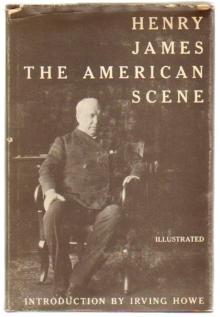 The American
The American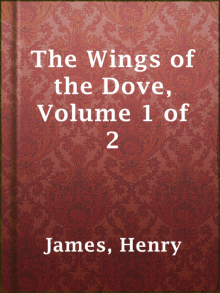 The Wings of the Dove, Volume 1 of 2
The Wings of the Dove, Volume 1 of 2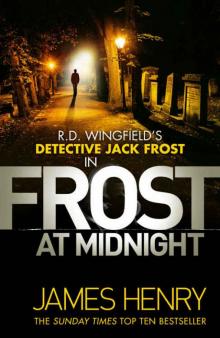 Frost at Midnight
Frost at Midnight Morning Frost
Morning Frost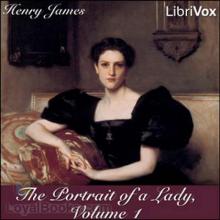 The Portrait of a Lady — Volume 1
The Portrait of a Lady — Volume 1 Fatal Frost
Fatal Frost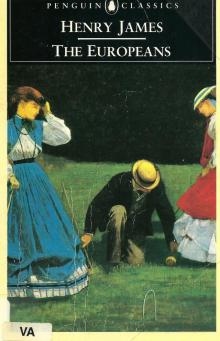 The Europeans
The Europeans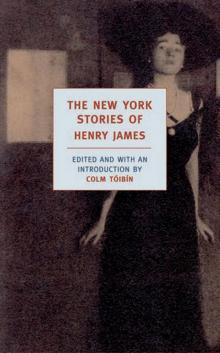 The New York Stories of Henry James
The New York Stories of Henry James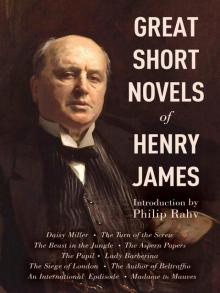 Great Short Novels of Henry James
Great Short Novels of Henry James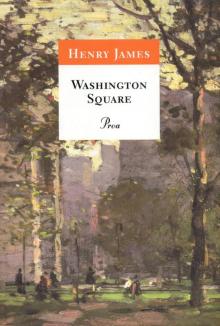 Washington Square
Washington Square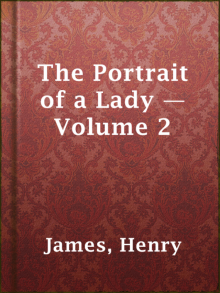 The Portrait of a Lady — Volume 2
The Portrait of a Lady — Volume 2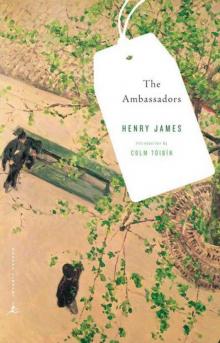 The Ambassadors
The Ambassadors The Wings of the Dove
The Wings of the Dove The Princess Casamassima (Classics)
The Princess Casamassima (Classics)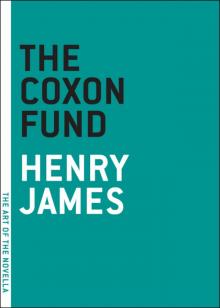 The Coxon Fund
The Coxon Fund First Frost
First Frost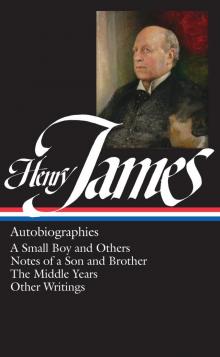 Henry James
Henry James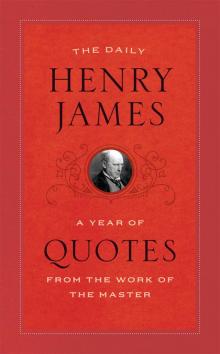 The Daily Henry James
The Daily Henry James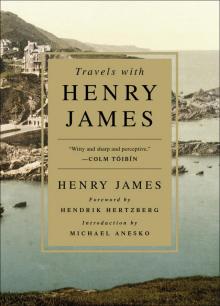 Travels With Henry James
Travels With Henry James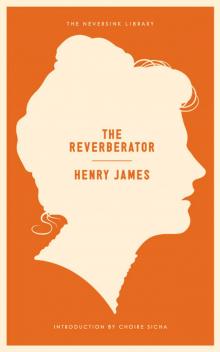 The Reverberator: A Novel
The Reverberator: A Novel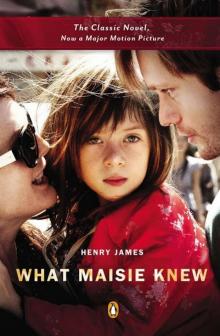 What Maisie Knew (Henry James Collection)
What Maisie Knew (Henry James Collection)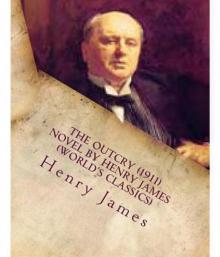 The Outcry
The Outcry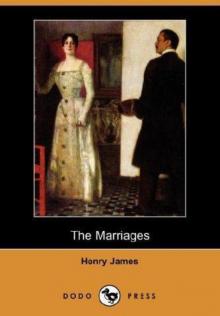 The Marriages
The Marriages The Wings of the Dove, Volume 2
The Wings of the Dove, Volume 2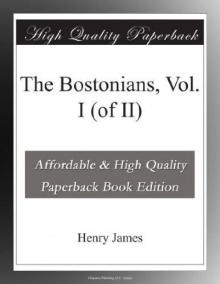 The Bostonians, Vol. I
The Bostonians, Vol. I The Outcry: -1911
The Outcry: -1911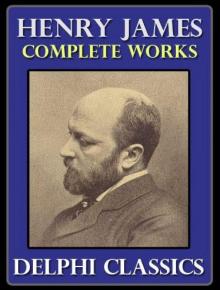 The Complete Works of Henry James
The Complete Works of Henry James Letters from the Palazzo Barbaro
Letters from the Palazzo Barbaro The Pupil
The Pupil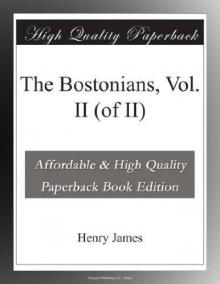 The Bostonians, Vol. II
The Bostonians, Vol. II Pandora
Pandora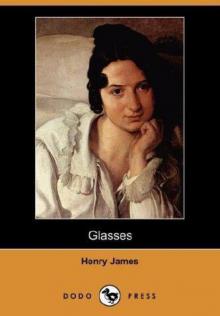 Glasses
Glasses The Princess Casamassima
The Princess Casamassima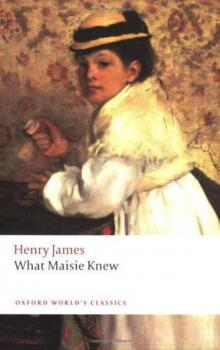 What Maisie Knew
What Maisie Knew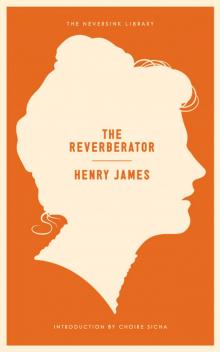 The Reverberator
The Reverberator The Golden Bowl - Complete
The Golden Bowl - Complete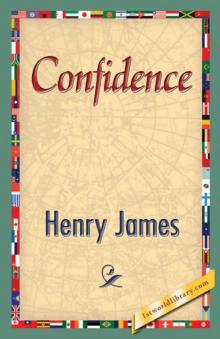 Confidence
Confidence Wings of the Dove (Barnes & Noble Classics Series)
Wings of the Dove (Barnes & Noble Classics Series) The Spoils of Poynton
The Spoils of Poynton